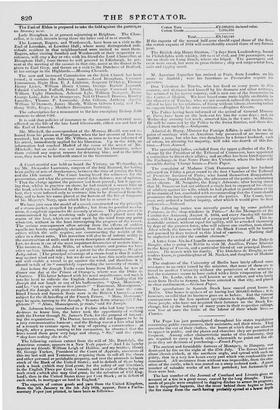A Court-martial was held on board the Victory, on Wednesday,
to try Mr. Alexander Lawrence, surgeon of the brig Blizzard, for having been guilty of acts of drunkenness, between the time of joining the brig and the Ilth instant. The Court having heard the witnesses for the prosecution, and what the prisoner stated in his defence, was of opinion, " That the charge against the prisoner had been proved ; but it appear- ing that, whilst in practice on shore, he had received a severe hurt on the head, which was followed by fits of epilepsy, and injury to his intel- lect, they were induced only to sentence him to be dismissed from the brig, and to have his name placed at the bottom of the list of Surgeons of his Majesty's Navy, upon which list he is never to rise."
We have just seen the model of a vessel, constructed on the principle of a steam-packet, propelled by paddles ; but from its peculiar mecha- nism, it completely supersedes the necessity if steam. The given lion cr is communicated by tour revolving sails (gigot shape) placed over the centre of the boat, which arc acted upon by the wind from any point whatever, without in the least interrupting the progress of the vessel. Time serious consequences often arising from the effects of sudden squalls are hereby completely obviated, from the accelerated horizontal action which the sails require, one counteracting the weight of the other in a direct ratio. This invention will also be of infinite utility in the construction of mills used in every description of manufacture. III fact, we deem it one of the most importata discoveries of modern times. The inventor, Mr. John Willis, of whose talents and genius we have often spoken, intends taking out a patent for the discovery.— ilisifas/ Independent. [The principal advantage of a steam-boat is that it makes way against wind and tide ; but we do not see how this newly-invented sail will enable a vessel to go against the wind, and therefore it is absurd to talk of its " completely superseding the necessity of steam."]
Just before Sir Joseph Yorke came home from Holland, he was ut dinner one day at the Prince of Orange's, where was the Duke de Chartres. This latter behaved with his usual impoliteness, and took it into his head to ridicule the English Ambassador. Finding that Sir Joseph did not laugh at any of his buffooneries, " Quoi, Monsieur," said he, "est cc que vous ne riez jamais?" " Rarement, Monseigneur," replied Sir Joseph, with great coolness. Just at that tiine the com- bined French and Spanish fleets were in the British Channel—a new subject for the ill-breeding of the French Prince. " Mais, Monsieur," says he again, turning to Sir Joseph," Si notre flotte attacquaait l's1n- gleterre?" " Alors, Monseigneur, je rirais," said Sir Joseph.
Dr. Johnson being introduced to a Prelate who had long been very desirous to know him, the latter took the opportunity of walking with the Doctor through St. James's Park, for the purpose of improv- ing the acquaintance. The Doctor, however, did not happen to be in a very communicative humour ; and the Bishop %resat a loss what kind of a remark to venture upon, by way of opening a conversation : at length, after a pause, turning to his companion, he observed that the trees ro llllll them grew very large and strong, " Sir," said the cynic, " they have nothing else to do."
The following curious extract from the will of Mr. Randolph, the American senator, appears in a New York paper—" And I do hereby appoint my friends William Leigh of Halifax, and my brother, Henry St. George Tucker, President of the Court of Appeals, executors of this my last will and Testament; requiring them to sell all the slaves and other personal or perishable property, and vest the proceeds in bank stock of the Bank of the United States ; and in default of there being such a bank (which may God grant, for the safety of our liberties), in the English Three per Cent. Consols; and in case of there being no such stock (which also may God grant, for the salvation of Old Eng- land), then in the United States three per Cent Stock ; or in defect of such stock, in mortgages on land in England."
The exports of cotton goods and yarn from the United Kingdom, from the 5th January to the 5th July 1834, appear, from a Parlia- mentary Poper just printed, to have been as follows—
Cotton Yarn £2,348,655 declared value.
Cotton Goods 7,395,193 Total £9,743,848 If the exports of the second half-year should equal those of the first, the cotton exports of 1834 will considerably exceed those of any former year.
The British ship Henry Grattan, .71.3! days from Londonderty, bound to Philadelphia with whisky, -200 toss of coal, and 180 passetigers, was run on shore on Long Beach, where she bilged. Time passengers and crew were saved, but were in great distress; ship and cargo a total loss, sails and rigging saved.


















 Previous page
Previous page